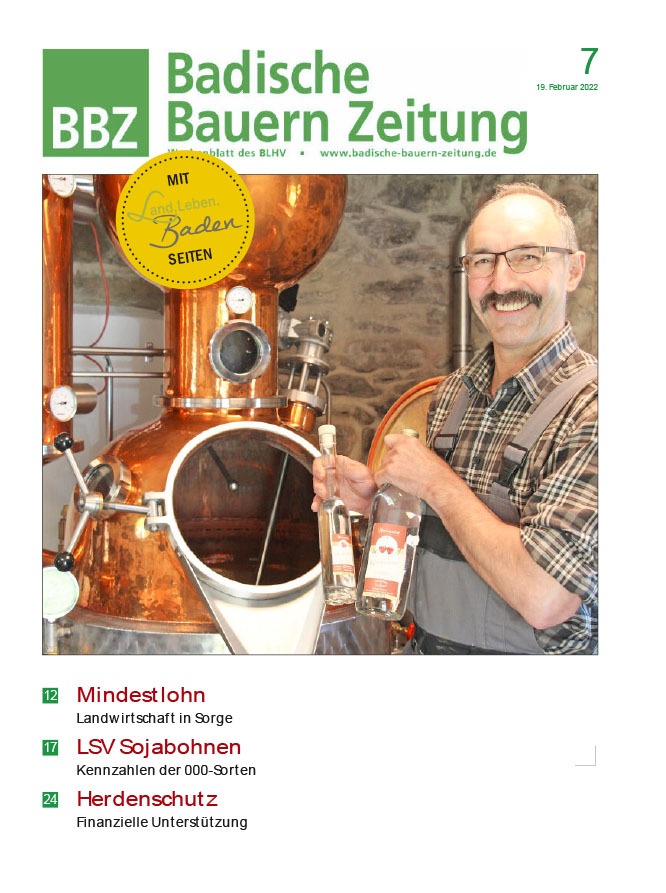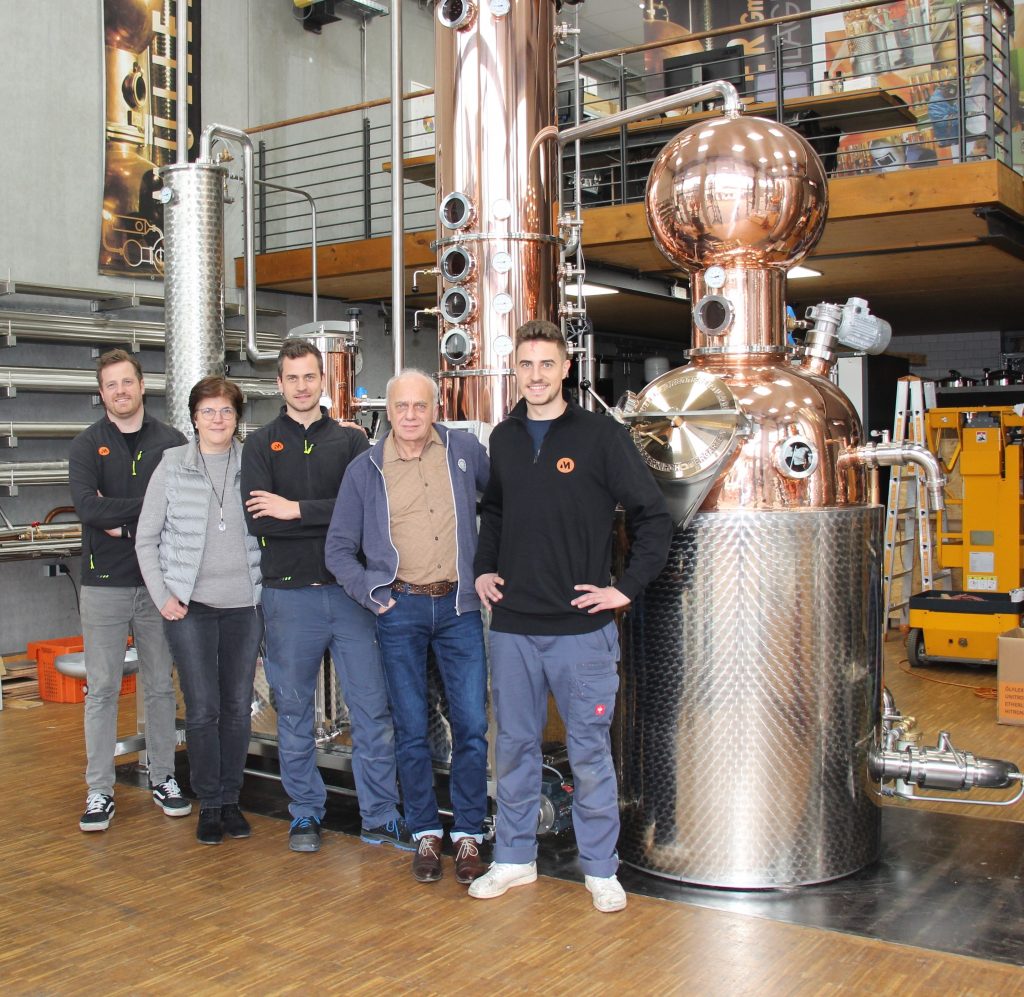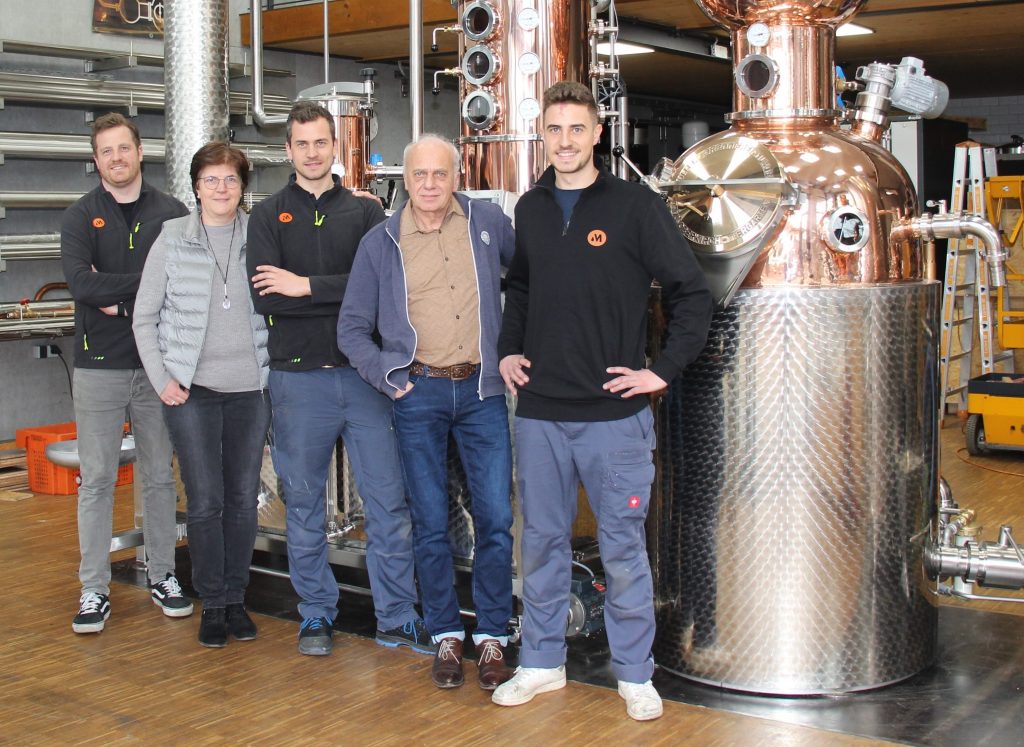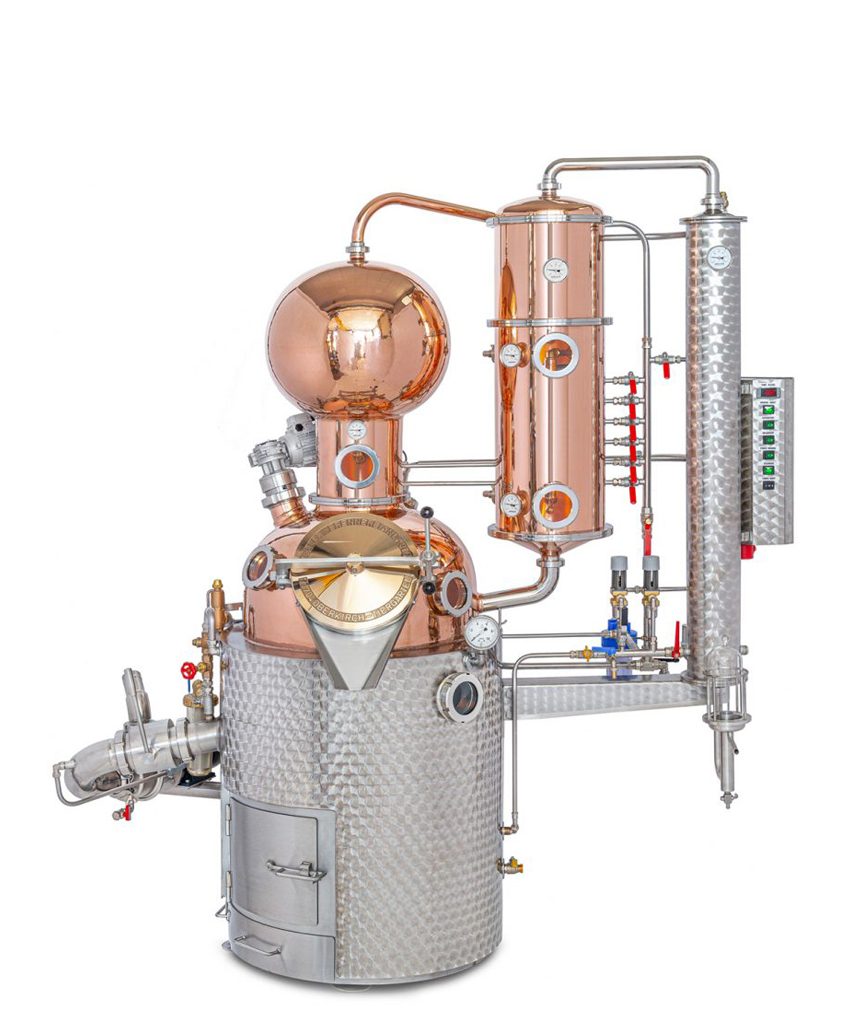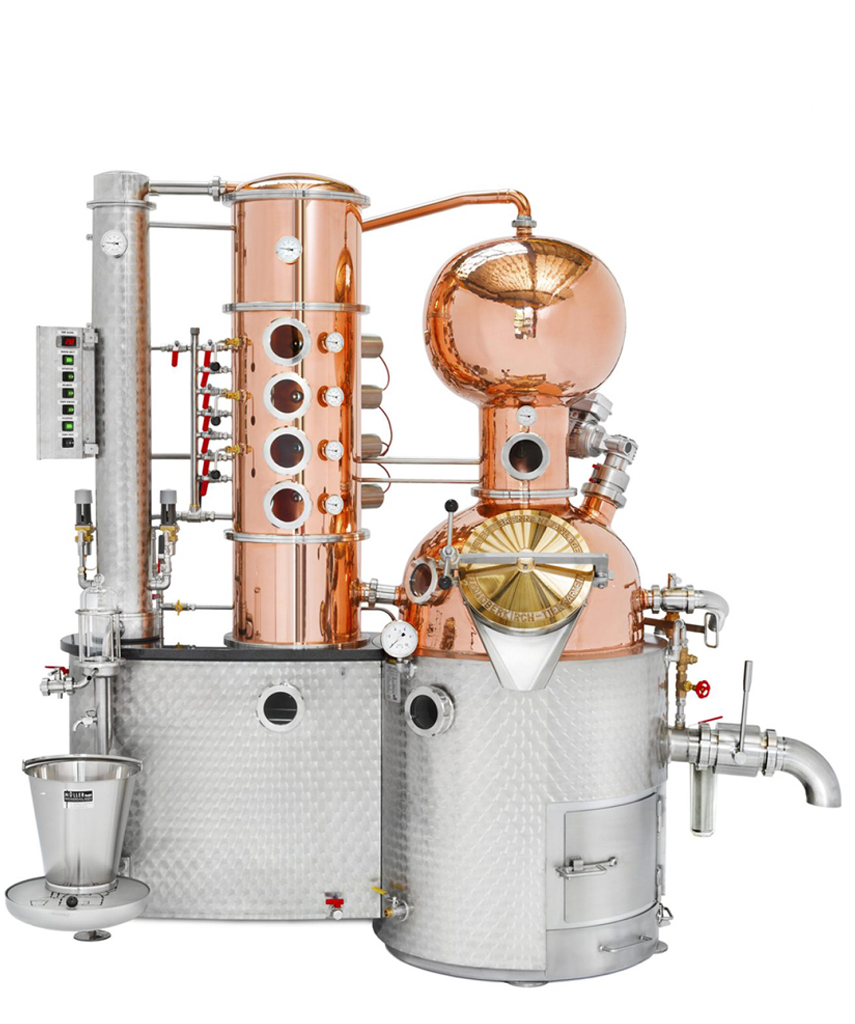Dhe Badische Bauern Zeitung writes in the 7th edition 2022, under the title "On to new burner worlds Generation 4.0 at the start" about us.
Learn more now, on the pages of Badische Bauern Zeitung
Read the article now:
Published in the Badische Bauern Zeitung on 19.2.2022
FAMILY BAND Quality and progress, that's what the family business Müller Brennereianlagen in Ortenau stands for. The company manufactures stills using traditional craftsmanship and supplies modern distillation equipment. Since the two sons joined the business, the orientation has been international. Now gin is also distilled in Australia with Müller plants. Cohesion within the family is important for success.
Who follows the fruit trees, with their apple, cherry and plum blossoms, which will again give off their fragrance in the spring,
is exactly right. The way to the Müller family leads to Tiergarten, a district of
Oberkirch. A village with a rural character: 800 people live here, elementary school, church, in the middle of the village lies the production site of the family business: the
Müller Distillery Plants Ltd. A company with twelve employees, managed in
third generation.
Behind the large window front of the striking new building, production is still done by hand today. Tradition and innovation go hand in hand here. This morning, Lukas Müller is standing in the workshop in front of a brand-new distillation plant, with various electrical cables in his hands. The junior is still putting the finishing touches to it; tomorrow the plant is to go to the customer. Equipped with a computer for digital control. Burning according to program? That, too, is available at the customer's request. "Every plant is unique," says Managing Director Bernd Müller.
Business succession is secured
The beginnings of the company go back to 1929. At that time, the great-grandfather Franz Müller founded a company with a focus on blacksmithing. After the Second World War, the manufacture and repair of distillery equipment developed as a trend-setting activity. His son Friedrich developed the business further in the 1960s, and the company Friedrich Müller Apparatebau became known beyond the Ortenau region. Today's managing director and master coppersmith Bernd Müller took over in 1993 with the support of his wife Claudia. And since their two sons Sebastian (32) and Lukas (30) joined the family business four years ago, an international wind has been blowing, with digitalization also playing a role.
The fact that the two young people have chosen the family business is for
parents Bernd and Claudia Müller an asset. The third son, Clemens (25), is currently studying automation technology and is keeping his options open as to whether he will also join the company. So the family is well positioned for the handover to the fourth generation. But how does a business succession succeed?
"You have to be flexible and give free rein to the ideas of the younger generation and also the employees," says Bernd Müller. All ideas have to be put to the test, he adds. "You don't have to constantly reinvent yourself, but what we do we should always improve," he emphasizes. And his wife Claudia adds, "We never forced our sons to do anything, everyone could study what they wanted." Sebastian studied business administration, gained experience in large companies, but then realized that he couldn't really make a difference. He saddled on an apprenticeship as a distiller and returned home. His brother Lukas is
industrial engineer and a trained tank and equipment builder. He, too, was initially drawn to Munich for his career. Afterwards, he also decided to join his parents' company. The tasks are distributed in such a way that everyone can contribute their skills. Father Bernd is in charge of national sales, Sebastian looks after international customers and marketing. Lukas is responsible for production and sales, and two women manage the office: Claudia Müller as a trained tax clerk and Christa Würtz, Bernd Müller's sister and a wholesale and retail saleswoman, does the purchasing. When the family is together a lot, there are of course discussions, but Bernd Müller says that he always makes a point of having lunch together. Is it even possible to switch off? Parents and sons cast a meaningful glance at each other. A general shrug of the shoulders, then Lukas charmingly gets to the point: "Lunch is just a business meeting," he says. The rest of the family nods. On the weekends, however, everyone goes their own way. There has to be a little bit of garbage-free.
With hammer and heart
A loud hammering and banging noise emanates from the workshop. Sebastian Müller takes us on a tour. It smells of metal, like touching a piece of iron. The men we meet, who are the ones who matter here, sometimes have to wear hearing protection, welding helmets and thick work gloves when they work. This is the place where the equipment is created by hand, with power shaper, hammer, welder, polishing machine. The traditional manufacturing process is time-consuming, but it guarantees constant material thickness of the copper plates used. In the locksmith's shop, steel and stainless steel are used to build the furnace and water bath. The workers in the coppersmith's shop make the copper components of the distillery, right now they are working on a copper still. This is the heatable boiler in which the mash will later be heated to evaporate the highly volatile ingredients. The raw slabs are formed into a hemispherical shape by hand at the Kraftformer before being hardened by the hammering technique for surface finishing. This hammering is a time-consuming and power-intensive step. In the process, the copper is compacted. The copper hammering technique makes the surface smooth, durable and provides strength. "This is important because the copper is heavily stressed by the reaction with fruit acids and mash," explains Sebastian Müller.
Before final assembly, the copper parts are polished to a high gloss with a polishing machine.
brought. It takes three to four weeks from the first hammer blow to delivery of a complete distillation plant.
Plants go all over the world
"Our main customer base is in the Baden region, Alsace, Austria, Switzerland and Hungary," says Sebastian Müller. Customers have to be patient and have the necessary budget. Such a ready-made plant, specially manufactured according to the customer's wishes, is available from 20,000 euros, but it can also cost several times that amount. "The demand is great. We currently have a delivery time of over a year," says Müller. Because of the Corona pandemic, it sometimes takes longer because containers are not available for shipment abroad, says Sebastian Müller, pointing to a distillery destined for a customer in Australia. The customers are hobby distillers, farmers, restaurateurs, start-ups and also "dropouts" who are reinventing themselves, or businesses that are building up a second mainstay, such as a market garden from NRW. Currently, according to the company's homepage, 1853 plants are in use worldwide, in 51 countries. Great Britain, Norway, Denmark, Spain, Italy, Belgium, Hong Kong, Tasmania, Kenya - to name just a few locations. In the meantime, 70 percent of Müller systems are shipped abroad. Logistically, this is not easy. For transport, each assembled system must first be dismantled and packed. Just a few days ago, Sebastian Müller returned from England, where he and his father Bernd Müller personally transported a new plant in a Sprinter. He counts up: one day of driving, one and a half days of setting up at the customer's site, and the same amount of time again for test firing with instruction. Sebastian Müller spends a lot of time on the road with international customers. Next week, he's off to Norway. Back in Germany, customer support is then provided via the Internet; in the case of digitalized plants, Müller can also log into the PC of a customer's plant. So far, such distilleries have been less in demand; most distillers are concerned with the craft. In addition to tradition, innovation is an important pillar of the company. Father Bernd Müller, for example, developed the Aromat with Baden's "top distiller" Herbert Rösch. What makes it special is a patented spiral technology. It is located in the column, the copper cylinder, instead of the usual boiling and sieve trays. The alcohol vapor rises upward toward the cooling dephlegmator. There is a constant mass transfer between the upward rising vapor and the downward flowing phlegm. Compared with distillation using conventional column technology, this column technology produces a significantly higher degree of efficiency. This results in particularly aromatic distillates.
Home distilleries create gin and whiskey
Thanks to the diversity of fruit, there are more than 1100 distilleries in the Renchtal, which is why the town of Oberkirch is considered the capital of distillers. "There are around 800 distilleries in Oberkirch alone, including districts," reports Bernd Müller. The fact that there are so many small distilleries in Baden is explained by history. It was Empress Maria Theresa (1717- 1780) who, in the 18th century, allowed farmers to produce 300 liters of alcohol a year to provide them with additional income. Millers also have a distilling right. Since the abolition of the spirits monopoly at the end of 2017, it has become more difficult for small distilleries to find worthwhile outlets. Many gave up. So the additional focus on international customers was a logical step for Müllers. And sons Sebastian and Lukas bring new impetus to sales with their knowledge of English. Production continues in the Baden homeland, which inspires. According to the Association of Small Distillers and Fruit Distillers in Baden, the classic fruit brandies are Kirschwasser, Williams or Mirabelle. But Baden's distillers today are bringing other flavors into the bottle, including from exotics such as medlar or rowanberry. Recently, gin and whiskey have become more common. Whether liqueurs, herbal bitters, vermouth, rum, grain or vodka: the products from Baden distilleries are diverse. There's still plenty for Müllers to do in the region, too.
Von: Christine Speckner
Dhe Badische Bauern Zeitung writes in the 7th edition 2022, under the title "On to new burner worlds Generation 4.0 at the start" about us.
Read the article now:
Published in the Badische Bauern Zeitung on 19.2.2022
FAMILY BAND Quality and progress, that's what the family business Müller Brennereianlagen in Ortenau stands for. The company manufactures stills using traditional craftsmanship and supplies modern distillation equipment. Since the two sons joined the business, the orientation has been international. Now gin is also distilled in Australia with Müller plants. Cohesion within the family is important for success.
Who follows the fruit trees, with their apple, cherry and plum blossoms, which will again give off their fragrance in the spring,
is exactly right. The way to the Müller family leads to Tiergarten, a district of
Oberkirch. A village with a rural character: 800 people live here, elementary school, church, in the middle of the village lies the production site of the family business: the
Müller Distillery Plants Ltd. A company with twelve employees, managed in
third generation.
Behind the large window front of the striking new building, production is still done by hand today. Tradition and innovation go hand in hand here. This morning, Lukas Müller is standing in the workshop in front of a brand-new distillation plant, with various electrical cables in his hands. The junior is still putting the finishing touches to it; tomorrow the plant is to go to the customer. Equipped with a computer for digital control. Burning according to program? That, too, is available at the customer's request. "Every plant is unique," says Managing Director Bernd Müller.
Business succession is secured
The beginnings of the company go back to 1929. At that time, the great-grandfather Franz Müller founded a company with a focus on blacksmithing. After the Second World War, the manufacture and repair of distillery equipment developed as a trend-setting activity. His son Friedrich developed the business further in the 1960s, and the company Friedrich Müller Apparatebau became known beyond the Ortenau region. Today's managing director and master coppersmith Bernd Müller took over in 1993 with the support of his wife Claudia. And since their two sons Sebastian (32) and Lukas (30) joined the family business four years ago, an international wind has been blowing, with digitalization also playing a role.
The fact that the two young people have chosen the family business is for
parents Bernd and Claudia Müller an asset. The third son, Clemens (25), is currently studying automation technology and is keeping his options open as to whether he will also join the company. So the family is well positioned for the handover to the fourth generation. But how does a business succession succeed?
"You have to be flexible and give free rein to the ideas of the younger generation and also the employees," says Bernd Müller. All ideas have to be put to the test, he adds. "You don't have to constantly reinvent yourself, but what we do we should always improve," he emphasizes. And his wife Claudia adds, "We never forced our sons to do anything, everyone could study what they wanted." Sebastian studied business administration, gained experience in large companies, but then realized that he couldn't really make a difference. He saddled on an apprenticeship as a distiller and returned home. His brother Lukas is
industrial engineer and a trained tank and equipment builder. He, too, was initially drawn to Munich for his career. Afterwards, he also decided to join his parents' company. The tasks are distributed in such a way that everyone can contribute their skills. Father Bernd is in charge of national sales, Sebastian looks after international customers and marketing. Lukas is responsible for production and sales, and two women manage the office: Claudia Müller as a trained tax clerk and Christa Würtz, Bernd Müller's sister and a wholesale and retail saleswoman, does the purchasing. When the family is together a lot, there are of course discussions, but Bernd Müller says that he always makes a point of having lunch together. Is it even possible to switch off? Parents and sons cast a meaningful glance at each other. A general shrug of the shoulders, then Lukas charmingly gets to the point: "Lunch is just a business meeting," he says. The rest of the family nods. On the weekends, however, everyone goes their own way. There has to be a little bit of garbage-free.
With hammer and heart
A loud hammering and banging noise emanates from the workshop. Sebastian Müller takes us on a tour. It smells of metal, like touching a piece of iron. The men we meet, who are the ones who matter here, sometimes have to wear hearing protection, welding helmets and thick work gloves when they work. This is the place where the equipment is created by hand, with power shaper, hammer, welder, polishing machine. The traditional manufacturing process is time-consuming, but it guarantees constant material thickness of the copper plates used. In the locksmith's shop, steel and stainless steel are used to build the furnace and water bath. The workers in the coppersmith's shop make the copper components of the distillery, right now they are working on a copper still. This is the heatable boiler in which the mash will later be heated to evaporate the highly volatile ingredients. The raw slabs are formed into a hemispherical shape by hand at the Kraftformer before being hardened by the hammering technique for surface finishing. This hammering is a time-consuming and power-intensive step. In the process, the copper is compacted. The copper hammering technique makes the surface smooth, durable and provides strength. "This is important because the copper is heavily stressed by the reaction with fruit acids and mash," explains Sebastian Müller.
Before final assembly, the copper parts are polished to a high gloss with a polishing machine.
brought. It takes three to four weeks from the first hammer blow to delivery of a complete distillation plant.
Plants go all over the world
"Our main customer base is in the Baden region, Alsace, Austria, Switzerland and Hungary," says Sebastian Müller. Customers have to be patient and have the necessary budget. Such a ready-made plant, specially manufactured according to the customer's wishes, is available from 20,000 euros, but it can also cost several times that amount. "The demand is great. We currently have a delivery time of over a year," says Müller. Because of the Corona pandemic, it sometimes takes longer because containers are not available for shipment abroad, says Sebastian Müller, pointing to a distillery destined for a customer in Australia. The customers are hobby distillers, farmers, restaurateurs, start-ups and also "dropouts" who are reinventing themselves, or businesses that are building up a second mainstay, such as a market garden from NRW. Currently, according to the company's homepage, 1853 plants are in use worldwide, in 51 countries. Great Britain, Norway, Denmark, Spain, Italy, Belgium, Hong Kong, Tasmania, Kenya - to name just a few locations. In the meantime, 70 percent of Müller systems are shipped abroad. Logistically, this is not easy. For transport, each assembled system must first be dismantled and packed. Just a few days ago, Sebastian Müller returned from England, where he and his father Bernd Müller personally transported a new plant in a Sprinter. He counts up: one day of driving, one and a half days of setting up at the customer's site, and the same amount of time again for test firing with instruction. Sebastian Müller spends a lot of time on the road with international customers. Next week, he's off to Norway. Back in Germany, customer support is then provided via the Internet; in the case of digitalized plants, Müller can also log into the PC of a customer's plant. So far, such distilleries have been less in demand; most distillers are concerned with the craft. In addition to tradition, innovation is an important pillar of the company. Father Bernd Müller, for example, developed the Aromat with Baden's "top distiller" Herbert Rösch. What makes it special is a patented spiral technology. It is located in the column, the copper cylinder, instead of the usual boiling and sieve trays. The alcohol vapor rises upward toward the cooling dephlegmator. There is a constant mass transfer between the upward rising vapor and the downward flowing phlegm. Compared with distillation using conventional column technology, this column technology produces a significantly higher degree of efficiency. This results in particularly aromatic distillates.
Home distilleries create gin and whiskey
Thanks to the diversity of fruit, there are more than 1100 distilleries in the Renchtal, which is why the town of Oberkirch is considered the capital of distillers. "There are around 800 distilleries in Oberkirch alone, including districts," reports Bernd Müller. The fact that there are so many small distilleries in Baden is explained by history. It was Empress Maria Theresa (1717- 1780) who, in the 18th century, allowed farmers to produce 300 liters of alcohol a year to provide them with additional income. Millers also have a distilling right. Since the abolition of the spirits monopoly at the end of 2017, it has become more difficult for small distilleries to find worthwhile outlets. Many gave up. So the additional focus on international customers was a logical step for Müllers. And sons Sebastian and Lukas bring new impetus to sales with their knowledge of English. Production continues in the Baden homeland, which inspires. According to the Association of Small Distillers and Fruit Distillers in Baden, the classic fruit brandies are Kirschwasser, Williams or Mirabelle. But Baden's distillers today are bringing other flavors into the bottle, including from exotics such as medlar or rowanberry. Recently, gin and whiskey have become more common. Whether liqueurs, herbal bitters, vermouth, rum, grain or vodka: the products from Baden distilleries are diverse. There's still plenty for Müllers to do in the region, too.
Von: Christine Speckner
